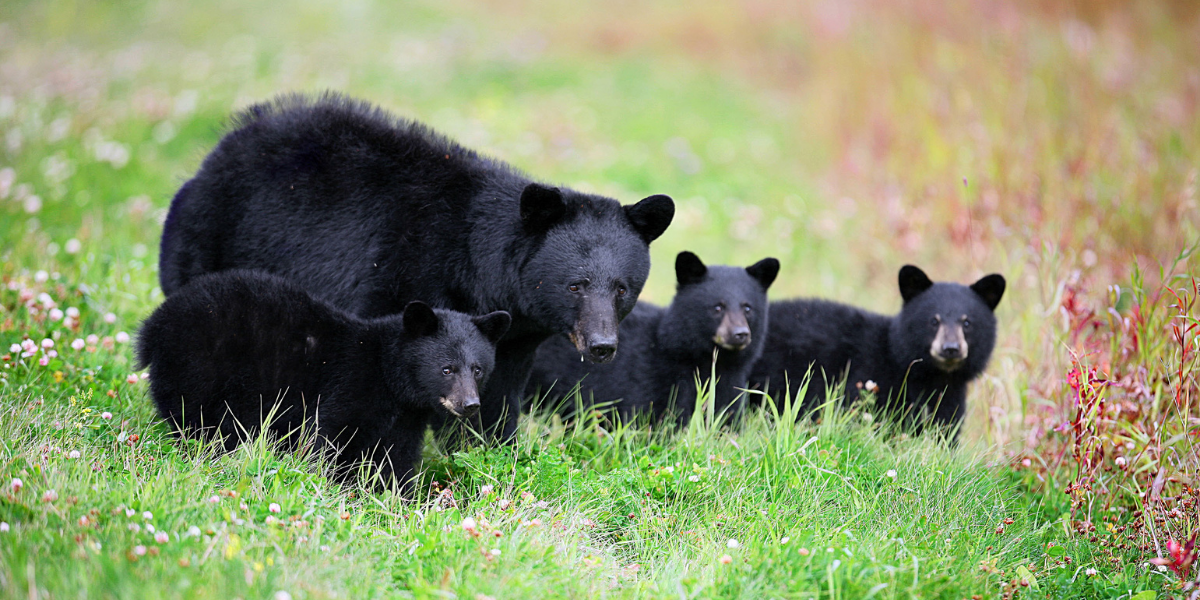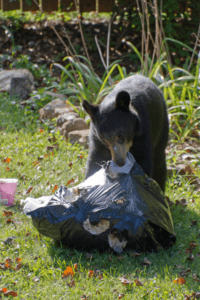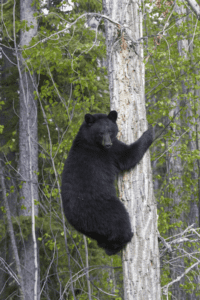Black Bear Fest, Facts and Feats

June 4 is National Black Bear Day, and no better time to celebrate the fact that Eastern North Carolina boasts the largest black bears and has the highest black bear densities in the world. Black bears and their habitat exemplify our state’s magnificent wild lives and wild places and why North Carolina Wildlife Federation is proud to support the N.C. Black Bear Festival in Plymouth, June 3-5.

North Carolina Wildlife Federation is a proud sponsor of the N.C. Black Bear Festival, June 4-5 in Plymouth.
Located on the banks of the Roanoke River, the “educational, whimsical, entertaining and diverse” Bear Fest attracts thousands of participants with music, food, wildlife refuge tours, films, river paddles, hot air balloon rides and wildlife exhibits. The award-winning annual event is a way for wildlife enthusiasts to enjoy the bears in the area and the other wildlife surrounding the Roanoke River area by water and air.
Become Black Bear Aware
While black bears are not inherently dangerous and rarely aggressive toward people, they can inspire fear, anxiety, and even fascination in people who encounter them. Bear sightings throughout the state are increasingly common as more people move into and near bear habitat.
And spring is a likely time to encounter black bears. In April, they emerge from winter hibernation and may move through residential areas as they search for food. If left alone, most bears that have wandered into a residential area will quickly retreat to their natural habitat, mainly if no food source is around.
N.C. Wildlife Resources Commission biologists urge people to be cautious and follow the six BearWise Basics to reduce potential conflicts and live responsibly with black bears.
BearWise Basics 
BearWise is a regional outreach effort to provide science-based resources and communicate consistent and effective messaging about how to live responsibly with black bears. BearWise encourages residents, businesses and communities to implement six BearWise Basics designed to keep bears wild and people safe.
Never feed (either intentionally or unintentionally) or approach bears. Feeding bears trains them to approach homes and people for more food. Bears are particularly attracted to human garbage, pet food and other human-associated foods, like birdseed. Bears will defend themselves if a person gets too close, so don’t risk your safety or theirs.
- Secure food, garbage and recycling. Food and food odors attract bears, so don’t reward them with readily available food or litter. Bags of trash inside cans stored in a garage, sheds or other secure areas; or use garbage cans or trash containers with a secure and bear-resistant latching system. Place trash outside as late as possible on trash pick-up days – not the night before.
- Remove bird feeders, including hummingbird feeders, when bears are active. Remove bird feeders when bears are active. Birdseed and other grains have high-calorie content making them very attractive to bears.
- Never leave pet food outdoors. Feed outdoor pets portion sizes that will be completely eaten during each meal and remove leftover food and food bowl.
- Clean and store grills. After using an outdoor grill, clean it thoroughly and make sure that all grease and fat are removed.
- Let neighbors know when bears are in the area. See bears in the area or evidence of bear activity? Tell your neighbors and share info on how to avoid bear conflicts. Bears have adapted to living near people; now, we must adapt to living near bears.
For more information on becoming a recognized BearWise community or business in North Carolina, go to ncwildlife.org/bearwise or email bearwise@ncwildlife.org.
The Bear Facts
- North Carolina’s Albemarle-Pamlico Peninsula has the highest black bear densities in the world.
- Black bears have 42 teeth, compared to humans’ 32 (28 if no wisdom teeth), which support their omnivorous diet.
- Black bears have a wide array of vocalizations with 11 different communication sounds, including barking, grunting, moans, roars and purrs.
- The current world record heaviest black bear is an 880-pound bear from Craven County in 1998.
- Black bears have climbing abilities and may run up to 35 miles per hour.
- Delayed implantation is a biological mechanism that allows bears to take advantage of resource availability. When food is abundant, more bears will be born. When there is a lack of abundant food sources, female bears will not reproduce every two years, but alternatively, every three to four years.



